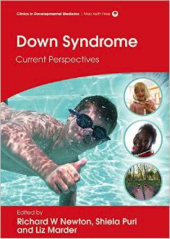Overview
There is little research on mental health difficulties in children with Down syndrome. In general, people with learning difficulties are more at risk of behavioural, emotional or psychiatric problems as compared to the non-intellectually disabled. People with Down syndrome are reported to have a lower incidence of behavioural problems than others with intellectual disability but still at greater risk than the non-disabled population. Current estimates are that 18-38% of children with Down syndrome will develop neurobehavioral or psychiatric co-morbidity at some point. The symptoms displayed by children with Down syndrome vary depending on degree of language and communication impairment, intellectual disability and age.
Mental health difficulties encompass a wide range of disorders including anxiety, obsessive compulsive behaviours, chronic sleep difficulties, hyperactive-type behaviours, autistic spectrum disorder, depression and regression, with decline in cognitive and social skills.
It is important in all children whose behaviour changes to rule out organic causes e.g. thyroid dysfunction, constipation, obstructive sleep apnoea, chronic inflammatory processes as well as non-organic precipitants such as significant life events eg abuse, changes to family make up.
Presentations at DSMIG Meetings
Materials from meetings are available for members only who need to log in to access them. For details on how to become a member click here.
Additional Resources
Mental Health Issues & Down Syndrome Kerim Munir, M.D., MPH, D.Sc. article on NDSS website – last accessed 19/3/16
Foley et al .94(19):e710,May2015 2.
Neurobehavioural disorders in children, adolescents and young adults with Down syndrome
Capone G et al., Â Journal of Medical genetics. Part C, Seminars in Medical Genetics. 142C(3):158-72,2006 Aug15
Book Chapter -Â Neuropsychiatry of Down Syndrome
Richard Newton, Jeremy Turk, Tiina Annus, Liam Reese Wilson and Anthony Holland

